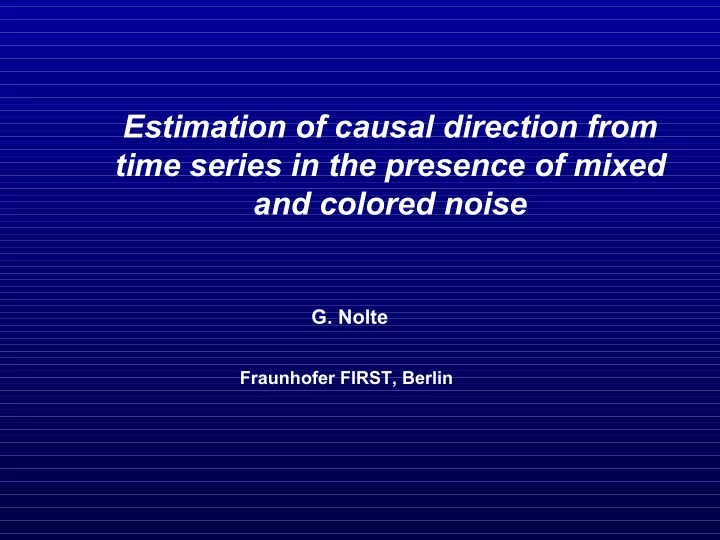

Estimation of causal direction from time series in the presence of mixed and colored noise G. Nolte Fraunhofer FIRST, Berlin
EEG Typical Properties of Data > 10 minutes measurement > 100 samples/sec 19-128 channels ⇒ Some millions of data points
1. Divide data into epochs (e.g. of 1 sec) 2. Make an analysis in each epoch and average over epochs
The Problem of volume conduction T 1 T 2 T 1 << T 2
z i ( f , k ) Data: Channel Epoch Frequency 1 K ∑ = ∗ S ( f ) z ( f , k ) z ( f , k ) Cross-spectrum: ij i j K = k 1 S ( f ) = ij C ( f ) Coherency: ij S ( f ) S ( f ) ii jj
Independent sources do not contribute to the imaginary part of the cross-spectrum = + S ( f ) Re( S ( f )) i Im( S 12 f ( )) 12 12 P 0 0 1 0 P 0 = 2 T S L L 0 0 P M
PISA Imaginary parts sPCA Interaction MOCA independent PSI
Granger causality 1 E x = 1 F log E → E y x 2 y ˆ = − G F F → → x y y x ˆ G G = ˆ std ( G )
Motivation • Many measurements like EEG/MEG/fMRI are extremely noisy Mixtures of independent sources: Additive noise: Do we estimate fake direction? Do we estimate wrong direction? Channel B Channel A Channel B Channel A Noise Source 2 Source 1 Noise Source
Channel B Channel A Granger Causality Noise Source
Phase Slope Index (PSI)(ψ) Observations: A Independent sources do not contribute to the imaginary part of the cross-spectrum B Slope of phase of cross-spectrum indicates direction
B Slope of phase-spectrum indicates temporal ordering Data Decomposition
Combining A and B: Average of Phase-Slope such that it is insensitive to mixtures Nolte, et.al., Phys Rev Let., 2008
. 95 0 = A ( 1 ) . 95 . 5 White Noise Source 2 Source 1
Simulation: (1- γ ) true flow + γ mixed noise Comparison with Granger Causality γ Only No Only No Noise Noise Noise Noise
“I know that I don’t know anything” Sokrates No Only Noise Noise
• correct: +1 point Challenge • wrong: -10 points • “I don ‘t know”: 0 points Granger causality Phase Slope Index Correct wrong Total points Correct wrong Total points 736 100 -264 638 6 578 wrong correct correct wrong correct wrong I don’t know correct wrong correct wrong correct wrong
What matters: Simulated challenge data: • problem is generic (details are open to discussion) • evidence is weighted
Nonlinearity of order k Granger Causality
Nonlinearity of order k PSI
FAQ Question Answer Nonlinear systems? alright with exceptions In general; it possible but difficult to construct counterexamples Direct vs. indirect ? partialing (rarely) possible PSI is (trivially) correct, Bidirectional flux? (impossible to resolve completely) Not in the presence of noise, Estimate delay? Results are really binary
Alpha rhythm, Eyes closed, 88 subjects
Surrogate Data to test for artefacts of volume conduction ( ) = Data x ( t ) x ( t ), , x ( t ) 1 n = s ( t ) W x ( t ) 1. Demix with ICA = v ( t ) s ( t ) 1 1 2. Delay i.th component = + v ( t ) s ( t T ) 2 2 by (i - 1) * T = + v ( t ) s ( t 2 T ) 3 3 − = 1 x ( t ) W v ( t ) 3. Remix surr
Granger Causality, Data vs. Surrogates
Phase Slope Index, Data vs. Surrogates
Summary • Imaginary parts of cross-spectra is not affected by non-interacting sources ⇒ valuable quantity to study interactions • Direction with “Phase Slope Index” (PSI) • Surrogates with ICA
Thanks to Stefan Haufe Mark Hallett Andreas Ziehe Ou Bai Vadim Nikulin Lewis Wheaton Nicole Krämer Masao Matsuhashi Alois Schlögl Zoltan Mari Frank C. Meinecke Sherry Vorbach Florin Popescu Klaus-Robert Müller Tom Brismar Arne Ewald Forooz Shahbazi Laura Marzetti Gian Luca Romani
Recommend
More recommend